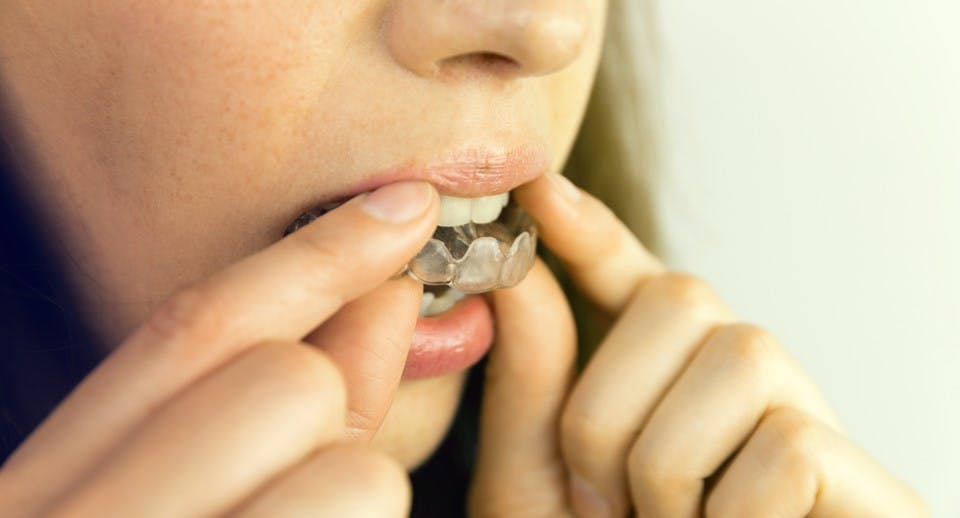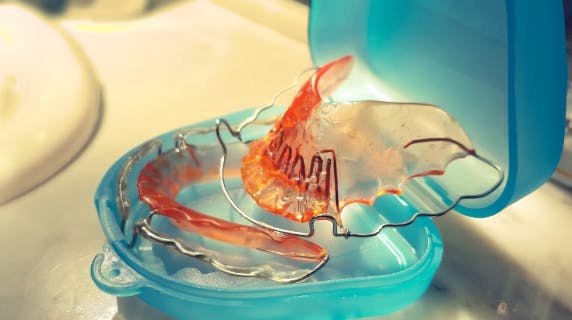NIGHTGUARDS, RETAINERS AND ALIGNERS. WHAT’S THE DIFFERENCE?
If you’re new to the world of removable dental appliances, like many people, you may be wondering: is there a difference between nightguards, retainers and aligners?
There are important key differences. Your dentist will talk you through which one is right for you based on your individual treatment needs.
What is an aligner?
Aligners are part of orthodontic treatment to improve the alignment of your teeth.
How does an aligner work?
Aligners are designed to apply just the right amount of pressure in just the right places to coax your teeth into a new position during orthodontic treatment.
You’ll be given an aligner by your dentist made from a mold of your teeth. It’s important to wear these aligners as advised by your dentist. Step by step, as you progress through your treatment your teeth will be moved gradually to their final positions. Once in place, your dentist may advise that you need to wear a retainer to keep them there.
What is a retainer?
Retainers are designed to keep your teeth in position following orthodontic treatment, such as tooth realignment or straightening. Once your teeth have been moved to their final position at the end of treatment, it will take time for the surrounding gum and bone to adjust to the new position. To be effective, retainers need to be worn in accordance with your dentist's advice. You can learn more about the different types of retainer here.
How does a retainer work?
Retainers are precision molded to fit the individual positions of your teeth. Like a tailor fits a suit, each retainer is made and fitted bespoke to you. They’re designed to keep your teeth from moving and hold them in place. They may feel a little strange at first, but by following your dentist's advice, this feeling should improve in a few weeks.
How should I take care of a retainer or an aligner?
It’s important to care for your retainer or aligner. Cracked or broken retainers or aligners may not hold your teeth in place and should be replaced by your dentist. It is also important to clean retainers and aligners regularly as bacteria can quickly build up and may lead to bad breath. Learn more clear retainers, aligners, nightguards and build up of germs here.
What is a nightguard?
At first glance a nightguard might look a lot like a retainer. Both may be made from clear plastic and fit over your upper or lower teeth.
How does a nightguard work?
If you grind your teeth at night (or bruxism to give it its medical name), you may have been recommended to wear a nightguard. Their main purpose is to protect your teeth by providing a barrier between your upper and lower teeth.
Why should I use a nightguard?
While there are many reasons why people grind their teeth, the potential harm to your teeth is the same. You may not even be aware you’re doing it, but the constant grinding wears down your teeth, abrading the enamel, potentially exposing more vulnerable parts of your teeth and weakening them.
How should I care for a nightguard?
Just like retainers, it’s important to care for your nightguard on a daily basis. Regular effective cleaning will reduce bacterial build up that can cause bad breath and discolouration. Using a suitable, specialist removable dental appliance cleanser daily, like Polident Pro Retainer & Guard Cleanser, can be a convenient and easy way to help ensure your retainer, aligner or nightguard is kept clean. These dissolvable tablets are gentle enough for daily use and specially designed with Crystal Clear technology to lift stains and keep your removable dental appliance clean and are proven to kill 99.99% of odor-causing bacteria in just 3 minutes.*
* In laboratory tests







